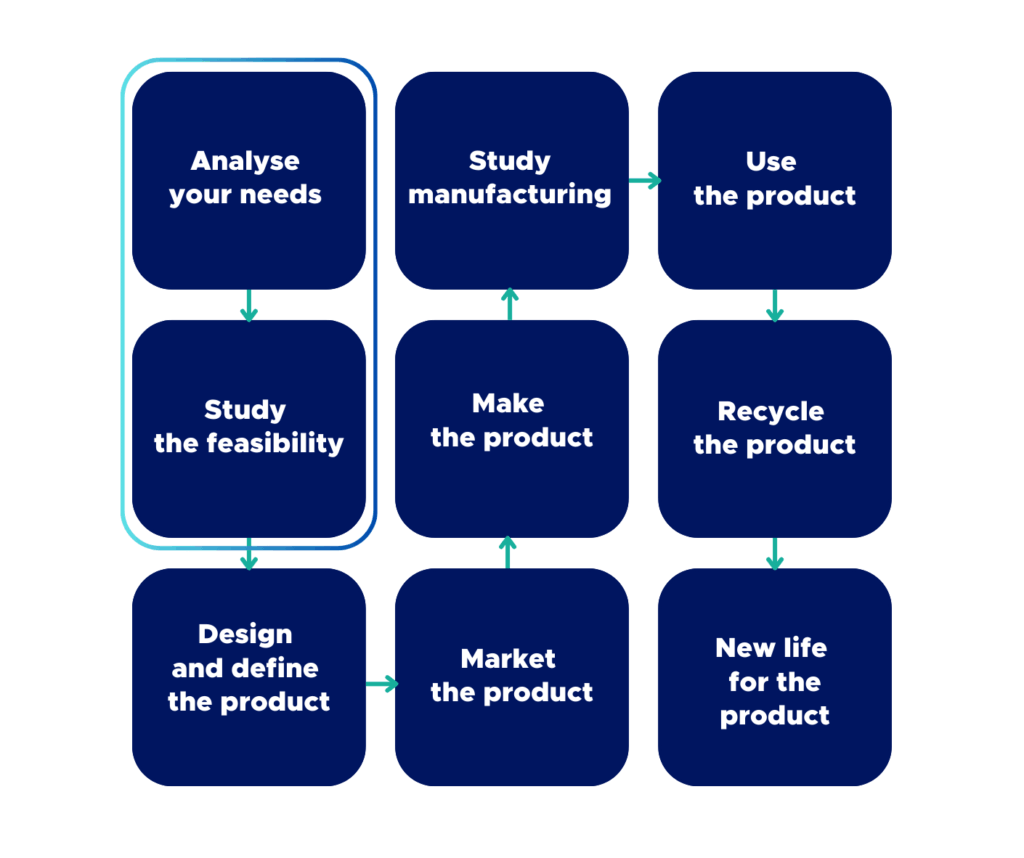L’analyste fonctionnel fait le lien entre les besoins métier et les équipes techniques afin de concevoir des solutions adaptées.
Points clés :
- L’analyste fonctionnel traduit les besoins métier en spécifications fonctionnelles claires.
- Il se distingue de l’analyste technique et du business analyst par son focus sur les fonctionnalités.
- Ses missions couvrent l’analyse, la rédaction, la coordination et la validation des solutions.
- Des compétences en communication, modélisation et gestion de projet sont essentielles.
- En Suisse, le métier offre de nombreuses opportunités d’évolution vers la gestion de projet ou le conseil.
What is functional analysis?
Functional analysis is a method of identifying, structuring and prioritising the functions of a system or service. The aim is to understand users’ needs, in order to design a solution that meets those needs in the best possible way. In concrete terms, this involves specifying the functions that a product must perform in its environment. This analysis plays a vital role, providing a common reference point for all stakeholders from the initial scoping phase right through to the project validation phase.
Product life cycle

Needs analysis
Needs analysis is a key stage in the product life cycle. It involves identifying, clarifying, qualifying, quantifying and structuring the expectations of potential users or customers. The aim is to transform an expression of needs that is often vague or subjective into requirements that are clear, measurable and verifiable. This information then serves as the basis for the design, development and validation of the product.
Conducted upstream of the project, the needs analysis makes it possible to:
- Align business objectives with technical ones,
- Limit the risks associated with differences in understanding,
- Prevent deviations in planning, costs or quality with a clear, well-defined scope,
- Guarantee that solutions are focused on user value.
This analysis is generally based on workshops where user needs are identified, interviews, field observations or documentary analyses, and results in deliverables such as:
- Le cahier des charges fonctionnel,
- Personas or typical user profiles,
- Process mapping or use case diagrammes,
- Or prioritisation (e.g. MoSCoW).
It also forms a basis for establishing traceability of requirements throughout the project: this is essential when it comes to maintaining consistency between the needs expressed and the functionality delivered.
Feasibility study
The feasibility study is a vital preliminary analysis for any project, aimed at determining whether it is technically feasible, financially viable and relevant to the company’s objectives.
What functional analysis can do:
- Check that the project can be carried out with the resources (whether human, technical, or financial) available, within the timeframe and budget set.
- Identify the strengths, weaknesses, risks and opportunities associated with the project, taking the environment (market, regulations, technological innovations, etc.) into account.
- Assess the profitability and relevance of the solution proposed, in particular by estimating the return on investment and the expected benefits.
- Detect any obstacles that could compromise the success of the project, in order to anticipate or avoid them.
- Provide decision-makers with objective information that helps them decide whether to continue, adjust or abandon the project.
The feasibility study takes the form of a written document setting out:
- Les besoins et objectifs du projet.
- L’analyse de l’environnement et des contraintes.
- L’étude des ressources nécessaires.
- L’évaluation des risques, des coûts et des délais.
- possible scenarios and recommendations.
It is therefore a key stage in project scoping, helping to shore up decision-making and optimise the chances of success during implementation.
If a company is to achieve this result, complete need analysis tasks and conduct a good feasibility study, a functional analyst is required.
What is a functional analyst and why are they essential?
Their main role is to understand and formalise the needs of business users, and translate them into clear functional specifications for the technical teams. They are the strategic interface between the business stakeholders and the development teams, ensuring that the solutions developed fully satisfy the functional expectations.
Il intervient à chaque étape de la vie du projet : de l’analyse du besoin à la validation des livrables, en passant par la rédaction des spécifications, la collaboration avec les développeurs et l’accompagnement des utilisateurs lors du déploiement ou de la prise en main des outils.
The difference between functional analysts, technical analysts and business analysts
The complexity of our current systems, coupled with the fact that users are becoming increasingly demanding, has given rise to a number of different specialisations within the analyst’s profession.
Functional analyst: Specialising in analysing business requirements and drafting functional specifications, the person in this role acts as a bridge between users and the technical teams.
Technical analyst: More focused on technical architecture, and the development and integration of IT solutions.
Business analyst: A term that is often used as a synonym for functional analyst, but which can also encompass broader assignments relating to strategy, governance or business process transformation.
The main tasks of a functional analyst
Gathering and analysing business needs
- Identifying users’ expectations and what irritates them, via needs gathering workshops
- Understanding the business challenges, existing processes and objectives to be achieved
- Formalising needs in the form of functional requirements
- Facilitating the prioritisation of needs in collaboration with stakeholders (MoSCoW prioritisation, etc.)
- Proposing collaborative solutions with project stakeholders
Writing functional specifications
- Writing functional specifications detailing needs and requirements.
- Defining management rules, use cases, expected interfaces and business scenarios.
- Issuing recommendations as to how requirements can be transformed into effective functionalities.
Coordination between business and technical teams
- Ensuring there is strong communication and understanding between users and technical teams.
- Supervising the project team with regard to functional matters and supporting implementation.
Functional testing and validation of solutions
- Participating in the design of test plans ‘with the team of testers’, carrying out functional tests and gaining approval for the solutions delivered ‘with users’.
- Confirming that functional deliverables comply with the expectations set out in the specifications.
- Documenting anomalies, monitoring the steps taken to resolve them and taking part in user acceptance testing.
- Training and assisting users with new applications.
What skills should a good functional analyst have?
To excel in this profession, a number of skills are required. A marked aptitude for analysis and problem-solving is essential, as is an understanding of business issues and excellent communication skills.
Process analysis and modelling
- Assurer la responsabilité analytique de plusieurs processus fonctionnel.
- Analyser et modéliser les besoins métier.
- Bonne culture technique et compréhension des enjeux du SI.
Understanding information systems
- Définir le cahier des charges fonctionnel.
- Being able to translate business requirements into detailed functional specifications that developers can understand.
- Understanding technical constraints without being a developer, in order to assess functional feasibility.
Communication and project management
- Excellent communication skills, good at teaching, team spirit, ability to explain things and train users
- Il est le référent pour l’équipe projet sur les aspects fonctionnels.
- Ability to listen actively, rephrase things, summarise information and explain complex concepts.

Mastery of tools and methods
- Connaissance des outils de modélisation (UML, BPMN), des méthodes de project management (Agile, Waterfall) et des normes de conception.
How do I set about becoming a functional analyst?
Training
To become a functional analyst, it is generally recommended that you have a 5-year higher education qualification. This could include a degree from an engineering school, a master’s degree in computing or information systems, or a degree in a specific functional area such as human resources, finance or another relevant sector, depending on the setting in which you are working.
Useful certifications
In a professional environment that is constantly changing, certifications play a key role in enhancing skills and strengthening job applicants’ credibility.
Among the most widely recognised of these is the CBAP (Certified Business Analysis Professional) certification, which attests to advanced expertise at business analysis, something that is ideal for professionals involved in defining requirements and optimising processes.
The title of Professional Scrum Product Owner (PSPO), meanwhile, highlights mastery of the roles and responsibilities of the Product Owner within an agile setting, encouraging the continuous delivery of value.
Finally, the Agile Certified Practitioner (PMI-ACP) certification demonstrates an in-depth understanding of agile principles and an ability to apply them in a variety of project settings. These distinctions are real assets when it comes to supporting organisations’ digital and methodological transformations.
How much can a functional analyst expect to earn?
The salary of a functional analyst depends on a number of factors, such as experience, skills, location and sector of activity.
What career prospects does a functional analyst have?
L’analyste fonctionnel peut évoluer vers des postes de chef de projet, consultant avant-vente, analyste-test et validation, architecte fonctionnel, responsable AMOA, PMO, Product Owner, Consultant(e) en transformation digitale, Scrum Master ou encore direction des systèmes d’information.
Sectors and companies recruiting functional analysts in Switzerland
In Switzerland, functional analysts are particularly sought after in several key sectors of the economy.
Les banques, les compagnies d’assurances, l’industrie, les administrations publiques ainsi que les grandes entreprises figurent parmi les principaux recruteurs, en raison de leur besoin constant d’optimiser les processus métiers et les systèmes d’information. Parallèlement, les sociétés de services informatiques (SSI/ESN) offrent de nombreuses opportunités, en intervenant auprès de clients variés pour piloter des projets de transformation digitale.
Finally, software publishers also represent an attractive job pool, particularly for individuals capable of bridging the gap between user needs and the technical solutions proposed. These dynamic environments offer stimulating, progressive career prospects to functional analysts.
Why choose Qim Info for your career as a functional analyst?
There are many reasons to choose this exciting profession:
- Diverse range of projects
- Expertise and proximity to customers
- Personalised professional support as regards ‘Training, certification etc.’
Joining Qim info means benefiting from an environment that is conducive to personal development and skills, a company that encourages innovation and career development in a dynamic sector undergoing constant transformation. It also means having the opportunity to work in sectors such as banking, finance, insurance, industry and the public sector. Check out all our current job offers!




